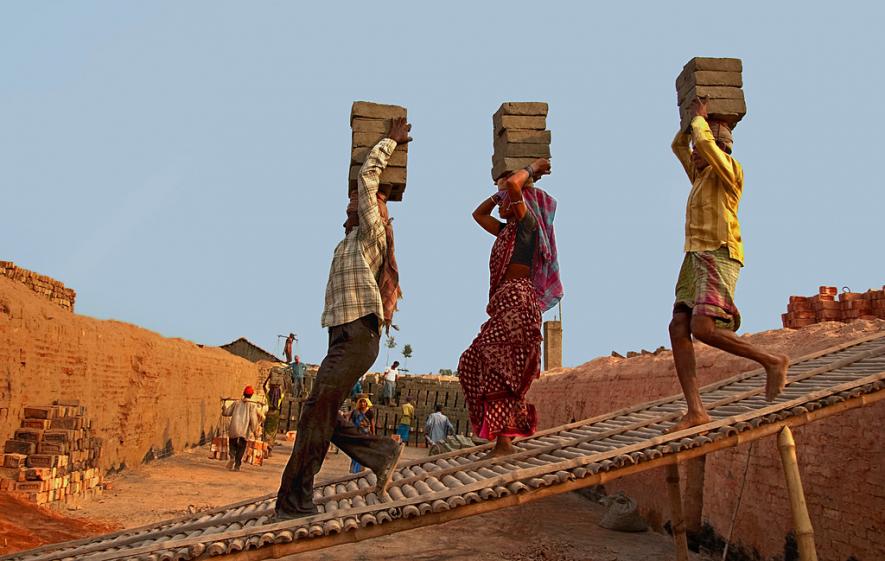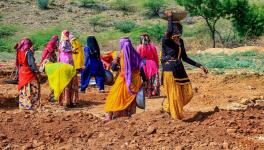MGNREGA Workers Wait for Pending Wages in West Bengal

Representational image. | Image Courtesy: Flickr
North 24 Parganas: It is slightly past 4.45 pm as a group of men rush through their last cup of tea before heading out for the evening namaz in North 24 Parganas’ Raghabpur village. The conversation mainly revolves around if work is available in the area. Most agree that there is none.
‘100 din er kaaj’ or work under the Mahatma Gandhi National Rural Employment Guarantee Act 2005 (MGNREGA), which guarantees 100 days of work per household in rural India, is sparse, they say. But most importantly, several workers are wary of taking up this work.
“It is almost two years now that we worked for digging up a pond. There was some confusion over which pond was to be dug. Work stopped in a few days. Till today, we have not received our payments,” said Mohammed Gazi.
The panchayat member who gave the go-ahead for the pond in Raghabpur village that she owns confirmed that at least 278 workers have not received their payments since the work was undertaken in May 2020.
A total strength of 700 workers was sanctioned for the project. With the sanctioning of the pond still mired in controversy, workers have given up hope on the payments. However, the panchayat member claimed that the required documents were in place.
NewsClick spoke to over a dozen workers who worked on the project till it abruptly came to a stop. The workers received no explanations or assurance on when they would receive their payments. Such irregularities mar the programme, said grassroots activists acquainted with the issue who wished to remain anonymous. Some workers have preserved their work slips hoping there would be a solution to the pending wages.
“It was the month of Ramadan. Imagine you are fasting and going to work for which you would not get paid,” said Anna Gazi, who worked for nine days.
Safiqul Islam Gazi, who runs a grocery store and participated in the work, said, “People have no work in the area. The situation was worse with the pandemic and lockdowns. When people heard of work in the area, they went to avail it. How would we know we would not get our payments till now?”
Discrepancies mar the implementation of MGNREGA with workers at the receiving end of the project, which has run into controversy. Tajmirah, the project supervisor, said there was documentation of 43 people employed in the project.
“There were issues over sanctioning of ponds, and the payments now remain stuck...The supervisor’s hands are tied when the final decision to go ahead with a project comes,” said Tajmirah.
Tajma, a member of gram panchayat and the pond owner where work was undertaken, claimed the paperwork over the sanctioning of the pond was in place, and the required documents were submitted at the panchayat.
“We had to stop the work because of local tensions and in-fighting among parties. We have not undertaken any work in the area since. We are trying to make the payment.”
According to Tajma, a project was sanctioned, but the local who owned the other pond backed out later, following which work started on the pond that Tajma owned.
Experts told NewsClick such instances were common across the country due to a lack of transparency in allocating work and the lack of adequate fund allotment.
Debmalya Nandi from NREGA Sangharsh Morcha said, “This is the story everywhere. It is a demand-driven programme but is not run like one. Once the budget gets exhausted, then the entire machinery goes slow.”
Once someone in the area informs work has started, people come in for work. Without adequate allocation, wage arrears keep mounting up.
In this year’s budget, the Centre allocated Rs 73,000 crore, of which over Rs 18,350 crore remains pending from previous years.
Under the MGNREGA, workers are entitled to compensation if they do not receive the payment within 15 days. However, the ground reality is a stark contrast.
An MGNREGA tracker by Peoples’ Action for Employment Guarantee (PAEG) analysed and accessed data on January 31, and the net national balance stood at a negative amount of Rs 15,190 crore. West Bengal had a negative balance of over Rs 2,000 crore. While Rs 11.78 crore was to be paid to workers as wage delay compensation, less than Rs 17 lakhs, or 1.52%, was paid, it said.
Mapuja Midder, who has worked for over 10 days, has no hopes pinned on the pending wage. Compensation for the delayed payment is a distant dream for her.
An estimate by the PAEG said that only 21 person-days of work could be generated per household with the current budget allocation.
The tracker’s analysis showed that pan-India, there was an unmet demand of 10.93%. In West Bengal, the unmet demand was over 6.50%.
Across India, the total value of delayed Stage 1 wage payments was Rs 727.24 crore, with West Bengal’s delayed payments amounting to Rs 12.85 crore. In the case of West Bengal, there were over 8,700 transactions where there were delays between 31 – 60 days. The delays between 61 – 90 days were of 1,774 transactions, and 2,407 transactions where the delay was more than 90 days. In terms of delayed compensations across West Bengal, the amount payable was over Rs 8.75 lakh, as per data analysed by NewsClick on February 12.
When it came to delays by the Centre, wage payments amounting to Rs 3,273.52 crore were pending as per data accessed by the PAEG on January 31. This amounted to 5.84% of the total wage payments, the analysis said.
As per data accessed by NewsClick on February 12, the stage 2 tracking showed that the number of transactions pending for response in West Bengal was 8,44,425. The amount involved in transactions awaiting response was Rs 183.76 crore.
Calling the latest budget allocation for the MGNREGA ‘disappointing’, labour economist KR Shyam Sundar said, “Despite the significant role played by the MGNREGA during the pandemic, and the social safety net it provided for rural workers, it was shocking to see this year’s allotment, which would be quite inadequate, to say the least. One also expected the government to increase the current 100 days to 150 and increase the MGNREGA wage rate. The working poor has not gained even marginally in this year’s budget,” said Sundar.
Ritwika Mitra is an independent journalist. The views are personal.
Get the latest reports & analysis with people's perspective on Protests, movements & deep analytical videos, discussions of the current affairs in your Telegram app. Subscribe to NewsClick's Telegram channel & get Real-Time updates on stories, as they get published on our website.
























